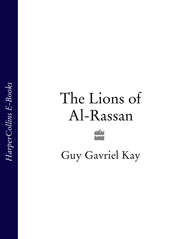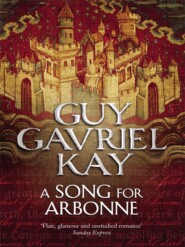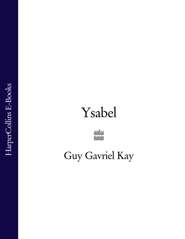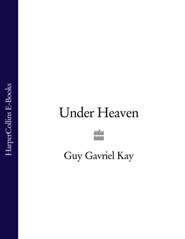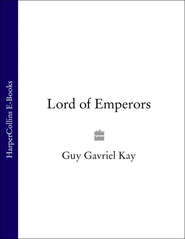По всем вопросам обращайтесь на: info@litportal.ru
(©) 2003-2025.
✖
River of Stars
Настройки чтения
Размер шрифта
Высота строк
Поля
Kang Junwen, a soldier, escapee from occupied lands
Shenwei Huang, a military commander
On the steppe
Emperor Te-kuan of the Xiaolu
Yao-kan, his cousin and principal adviser
Yan’po, kaghan of the Altai tribe
Wan’yen, war-leader of the Altai
Bai’ji, Wan’yen’s brother
Paiya, kaghan of the Khashin tribe
O-Pang, kaghan of the Jeni tribe
O-Yan, his youngest brother
PART ONE
CHAPTER I
Late autumn, early morning. It is cold, mist rising from the forest floor, sheathing the green bamboo trees in the grove, muffling sounds, hiding the Twelve Peaks to the east. The maple leaves on the way here are red and yellow on the ground, and falling. The temple bells from the edge of town seem distant when they ring, as if from another world.
There are tigers in the forests, but they hunt at night, will not be hungry now, and this is a small grove. The villagers of Shengdu, though they fear them and the older ones make offerings to a tiger god at altars, still go into the woods by day when they need to, for firewood or to hunt, unless a man-eater is known to be about. At such times a primitive terror claims them all, and fields will go untilled, tea plants unharvested, until the beast is killed, which can take a great effort, and sometimes there are deaths.
The boy was alone in the bamboo grove on a morning swaddled in fog, a wan, weak hint of sun pushing between leaves: light trying to declare itself, not quite there. He was swinging a bamboo sword he’d made, and he was angry.
He’d been unhappy and aggrieved for two weeks now, having reasons entirely sufficient in his own mind, such as his life lying in ruins like a city sacked by barbarians.
At the moment, however, because he was inclined towards thinking in certain ways, he was attempting to decide whether anger made him better or worse with the bamboo sword. And would it be different with his bow?
The exercise he pursued here, one he’d invented for himself, was a test, training, discipline, not a child’s diversion (he wasn’t a child any more).
As best he could tell, no one knew he came to this grove. His brother certainly didn’t, or he’d have followed to mock—and probably break the bamboo swords.
The challenge he’d set himself involved spinning and wheeling at speed, swinging the too-long (and also too-light) bamboo weapon as hard as he could, downstrokes and thrusts—without touching any of the trees surrounding him in the mist.
He’d been doing this for two years now, wearing out—or breaking—an uncountable number of wooden swords. They lay scattered around him. He left them on the uneven ground to increase the challenge. Terrain for any real combat would have such obstacles.
The boy was big for his age, possibly too confident, and grimly, unshakably determined to be one of the great men of his time, restoring glory with his virtue to a diminished world.
He was also the second son of a records clerk in the sub-prefecture town of Shengdu, at the western margin of the Kitan empire in its Twelfth Dynasty—which pretty much eliminated the possibility of such ambition coming to fulfillment in the world as they knew it.
To this truth was now added the blunt, significant fact that the only teacher in their sub-prefecture had closed his private school, the Yingtan Mountain Academy, and left two weeks ago. He had set off east (there was nowhere to go, west) to find what might be his fortune, or at least a way to feed himself.
He’d told a handful of his pupils that he might become a ritual master, using arcane rites of the Sacred Path to deal with ghosts and spirits. He’d said that there were doctrines for this, that it was even a suggested life for those who’d taken the examinations but not achieved jinshi status. Teacher Tuan had looked defensive, bitter, telling them this. He’d been drinking steadily those last weeks.
The boy hadn’t known what to make of any of that. He knew there were ghosts and spirits, of course, hadn’t realized his teacher knew anything about them. He wasn’t sure if Tuan Lung really did, if he’d been joking with them, or just angry.
What he did know was that there was no way to pursue his own education any more, and without lessons and a good teacher (and a great deal more) you could never qualify for the prefecture civil service tests, let alone pass them. And without passing those first tests the never-spoken ambition of going to the capital for the jinshi examinations wasn’t even worth a waking night.
As for these exercises in the wood, his fierce, bright dream of military prowess, of regaining honor and glory for Kitai … well, dreams were what happened when you slept. There was no path he could see that would now guide him to learning how to fight, lead men, live, or even die for the glory of Kitai.
It was a bad time all around. There had been a tail-star in the spring sky and a summer drought had followed in the north. News came slowly to Szechen province, up the Great River or down through the mountains. A drought, added to war in the northwest, made for a hard year.
It had remained dry all winter. Usually Szechen was notorious for rain. In summertime the land steamed in the humidity, the leaves dripped rainwater endlessly, clothing and bedding never dried. The rain would ease in autumn and winter, but didn’t ever cease—in a normal year.
This hadn’t been such a year. The spring tea harvest had been dismal, desperate, and the fields for rice and vegetables were far too dry. This autumn’s crops had been frighteningly sparse. There hadn’t been any tax relief, either. The emperor needed money, there was a war. Teacher Tuan had had things to say about that, too, sometimes reckless things.
Teacher Tuan had always urged them to learn the record of history but not be enslaved by it. He said that histories were written by those with motives for offering their account of events.
He’d told them that Xinan, the capital of glorious dynasties, had held two million people once, and that only a hundred thousand or so lived there now, scattered among rubble. He’d said that Tagur, to the west, across the passes, had been a rival empire long ago, fierce and dangerous, with magnificent horses, and that it was now only a cluster of scrabbling provinces and fortified religious retreats.
After school was done some days, sitting with his older students, he’d drink wine they poured respectfully for him and sing. He’d sing, “Kingdoms have come, kingdoms have gone / Kitai endures forever …”
The boy had asked his father about these matters once or twice, but his father was a cautious, thoughtful man and kept his counsel.
People were going to starve this winter, with nothing from the tea harvest to trade at the government offices for salt, rice, or grain from downriver. The state was supposed to keep granaries full, dole out measures in times of hardship, sometimes forgive taxes owed, but it was never enough, or done soon enough—not when the crops failed.
So this autumn there were no strings of cash, or illicit tea leaves kept back from the government monopoly to sell in the mountain passes to pay for a son’s education, however clever and quick he was, however his father valued learning.
Reading skills and the brush strokes of calligraphy, poetry, memorizing the classics of the Cho Master and his disciples … however virtuous such things were, they did tend to be abandoned when starvation became a concern.
And this, in turn, meant no chance of a life for the scholar-teacher who had actually qualified for the examinations in the capital. Tuan Lung had taken the jinshi examinations twice in Hanjin, before giving up and coming home to the west (two or three months’ journey, however you travelled) to found his own academy for boys looking to become clerks, with perhaps a legitimate jinshi candidate among the really exceptional.
With an academy here it was at least possible that someone might try the provincial test and perhaps, if he passed, the same imperial examination Lung had taken—perhaps even to succeed there and “enter the current,” joining the great world of court and office—which he hadn’t done, since he was back here in Szechen, wasn’t he?
Or had been, until two weeks ago.
That departure was the source of the boy’s anger and despair, from the day he bade his teacher farewell, watching him ride away from Shengdu on a black donkey with white feet, taking the dusty road towards the world.
The boy’s name was Ren Daiyan. He’d been called Little Dai most of his life, was trying to make people stop using that name. His brother refused, laughing. Older brothers were like that, such was Daiyan’s understanding of things.
It had begun raining this week, much too late, though if it continued there might be some faint promise for spring, for those who survived the winter that was coming.
Girl-children were being drowned at birth in the countryside, they’d learned in whispers. It was called bathing the infant. It was illegal (hadn’t always been, Teacher Tuan had told them), but it happened, was one of the surest signs of what was in store.
Daiyan’s father had told him that you knew it was truly bad when boys were also put into the river at birth. And at the very worst, he’d said, in times when there was no other food at all … he’d gestured with his hands, not finishing the thought.
Daiyan believed he knew what his father meant, but didn’t ask. He didn’t like thinking about it.
In fog and ground-mist, the early-morning air cool and damp, the breeze from the east, the boy slashed, spun, thrust in a bamboo wood. He imagined his brother receiving his blows, then barbarian Kislik with their shaved scalps and long, unbound fringe hair, in the war to the north.
His judgment as to the matter of what anger did to his blade skills was that it made him faster but less precise.






